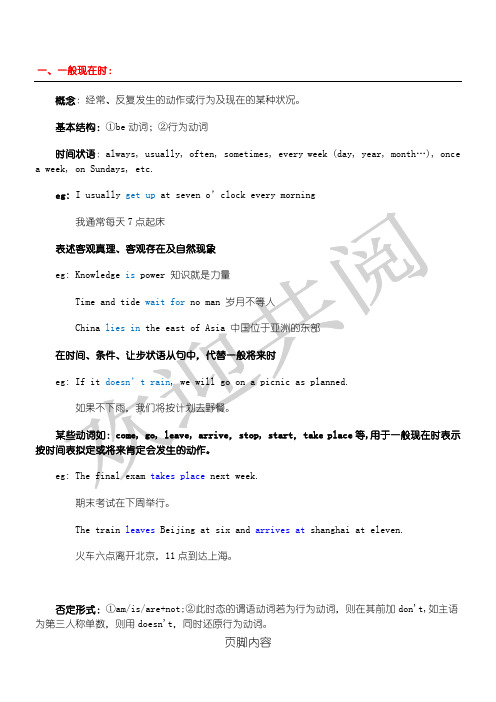一般现在时和一般将来时
- 格式:docx
- 大小:15.05 KB
- 文档页数:1

一、一般现在时:概念:经常、反复发生的动作或行为及现在的某种状况。
基本结构:①be动词;②行为动词时间状语:always, usually, often, sometimes, every week (day, year, month…), once a week, on Sundays, etc.eg: I usually get up at seven o’clock every morning期末考试在下周举行。
The train leaves Beijing at six and arrives at shanghai at eleven.火车六点离开北京,11点到达上海。
否定形式:①am/is/are+not;②此时态的谓语动词若为行为动词,则在其前加don't,如主语为第三人称单数,则用doesn't,同时还原行为动词。
一般疑问句:①把be动词放于句首;②用助动词do提问,如主语为第三人称单数,则用does,同时,还原行为动词。
二、一般过去时:概念:过去某个时间里发生的动作或状态;过去习惯性、经常性的动作、行为。
基本结构:①be动词;②行为动词时间状语:ago, yesterday, the day before yesterday, last week(year, night, month…), in 1989, just now, at the age of 5, one day, long long ago, once upon a time, etc.三、一般将来时:概念:表示从现在看来将要发生的动作或存在的状态及打算、计划或准备做某事。
时间状语:tomorrow, next day(week, month, year…),soon, in a few minutes, by…,the day after tomorrow, etc.四、过去将来时:概念:立足于过去某一时刻,从过去看将来要发生的动作或存在的状态,常用于宾语从句中。

知识图谱一般现在时知识精讲一、一般现在时表示通常性、规律性、习惯性、真理性的状态或者动作有时间规律发生的事件的一种时间状态。
二、句子结构主语(第一/二人称/第三人称复数)+do (动词原形)主语(第三人称单数)+does (动词三单形式)主语+am/ is /are用法示例表示经常性或习惯性的动作We get up at six every morning.我们每天早上六点钟起床。
表示现在的状态、能力、性格Mr. Wang writes good English but he doesn’t speak well.王先生的英文写得很好但他说不好。
表示格言或警句Pride goes before a fall.骄者必败。
表示永恒的客观真理The earth moves around the sun.地球绕着太阳转。
四、时间状语1. 表示频率的副词: always, usually, often, sometimes, never, hardly, seldom…2. every/once+名词: every day/ week/ year, once a week/ month …3. 表示时间的短语: twice a day, on weekends, on Mondays…情况变形示例一般情况加-s help-helps play-plays以辅音字母+o结尾加-es go-goes do-does以x, sh, ch, s结尾加-es teach-teaches brush-brushes以辅音字母+y结尾变y为i加es study-studies try-tries特殊情况没有统一的规则have-has; be-isbe动词行为动词用法我是am你是are;is跟着他/她/它;复数都用are。
主语是第三人称单数外,都用动词原形;主语是第三人称单数时,动词词尾加-s或-es。
肯定式I am a student.我是一名学生。

教学内容【例题精讲】例1.------ W ho is that lady?She's Miss Green. She us music, and she is so good.A. taughtB. teachesC. will teachD. is teaching 例 2. I think I'll take a bus to the meeting.A. do The bus? If you, you will be late.B. have doneC. will do例3. Unless the weather, we will have to cancel the picnic.A. improveB. improvesC. improvedD. will improve例4. We don't know if our friend .If he, we'll let you know.A. comes; comesB. comes; will come例5. Our geography teacher told us that the earth C. will come; comesthe sun.A. went aroundB. goes aroundC. is going aroundD. was going around【课堂练习】1.Look! A dog a blind man across the road.A. leadsB. leadC. is leadingD. led2.They usually TV in the evening.A. watchB. will watchC. are watchingD. watches3.He hardly up early.A. getsB. getC. doesn't getD. don't get4.John football.A. likes playingB. likes playC. like play5.Frank usually in touch with his primary school teachers by email.A. keepB. keepsC. keptD. will keep知识点二:一般过去时【知识梳理】(1)一般过去时的基本结构和变化1.定义:表示过去某时发生的动作或存在的状态。

一般现在时含义:表示事物(或人)的特征、状态,或表示经常性或习惯性的动作。
在一般现在时中,当主语是第三人称单数时,谓语动词要用第三人称单数形式,即常在动词原形后加-s或-es。
注:常见的词有:always、usually、often、sometimes等频率副词。
第三人称单数形式构成规则:1、大多数动词在词尾加“S”如:read-reads2、以辅音字母加“y”结尾的,要先将“y”变为“i”,然后在加“es”;以元音字母加“y”结尾的,直接加“S” 如:fly-flies play-plays3、以“s, x, ch, sh”结尾的,在词尾加“es”如:watch-watches4、以“o”结尾的动词,加“es”,如:go-goes5、以不发音字母“e”结尾的开音节词,加“s” 如:make-makes6、特殊:be动词包括:am,is,are第三人称单数为ishave -has三、写出下列动词的第三人称单数形式:visit--guess--take--go--rush--feel--cook--wash--fly--be--say--run--do--worry--live--watch--enjoy--have--like--play--use--teach--buy--study--四、用括号内动词的适当形式填空。
1. She often __________ (have)lunch at home.2. Sarah and Tom __________ (be) in Class One.3. We__________ (not watch) TV on Monday.4. Oliver __________ (not go) to school on Sunday.5.__________ they __________ (like)playing football?6. What __________ they often__________ (do) on Saturdays?7. __________ your parents __________ (read) newspapers?8. The girl__________ (teach) us English on Sundays.9. She and I __________ (take) a walk together every evening.10. There __________ (be) some water in the bottle.11. Mike__________ (like) cooking.12. He__________ (have) two new books.13. My sister __________ (look) after her baby carefully.14. You always __________ (do) your homework well.15. I__________ (be) ill. I’m staying in bed.16. She __________ (go) to school from Monday to Friday.17. Liu Tao __________ (do) not like PE.18. The child often __________ (watch) TV in the evening.19. -What day __________(be) it today?-It’s Saturday-How__________Dad __________(feel)?-He __________(feel) not well.-Where__________ he __________(work)?-He __________(work) at sea.现在进行时含义:表示正在做某事。

六年级英语语法之⼀般现在时、过去时、将来时,现在进⾏时1. ⼀般现在时(1)⼀般现在时中的be动词:⼀般⽤原形:am is are。
am⽤于第⼀⼈称单数(I);is⽤于第三⼈称单数(he she it和其他⼈名或称谓,如:Ben hissister等);are⽤于第⼆⼈称单数(you)和所有复数(包括第⼀⼈称复数we、第⼆⼈称复数you;第三⼈称复数they和其他复数,如the children 、 his parents等)。
例如:I am a boy 。
She is a good student。
You are the best。
They are aplle,pear and banana。
(2)⼀般现在时中的动词:①主语是第三⼈称单数(he she it 和其他,如Helen 、her cousin 等),动词后⼀般加s或es。
例如:She goes to school from Monday to Friday。
He likes to play basketball。
②主语不是第三⼈称单数,动词都⽤原形。
例如:I like milk。
They do homework together。
注意:⼀般现在时判断依据:①be动词是am、is、are;②动词⽤原形或加s、es;③没有时间状语或有usually、often、everyday、sometimes等不是具体的时间;2、⼀般过去时(1)⼀般过去时中的be动词:⼀般⽤过去式:was werewas⽤于第⼀⼈称单数(I)和第三⼈称单数(he she it和其他⼈名或称谓,如:Ben 、 hissister等);were⽤于第⼆⼈称单数(you)和所有复数(包括第⼀⼈称复数we、第⼆⼈称复数you;第三⼈称复数they和其他复数,如the children 、 his parents等)。
例如:I was at school just now。

一般现在时、将来时和现在进行时的讲解与练习一般现在时一、一般现在时的功能1.表示事物或人物的特征、状态。
如:The sky is blue.天空是蓝色的。
2.表示经常性或习惯性的动作。
如:I get up at six every day.我每天六点起床。
3.表示客观现实和普遍真理。
如:The earth goes around the sun.地球绕着太阳转。
二、一般现在时关键词always, usually, often, sometimes , seldom极少, hardly几乎不, never, every day(week, year, night), on Sundays, on Monday, in the evening, once/ twice/ three times a month每月一次/两次/三次三、一般现在时的构成1. be动词:主语+be(am,is,are)+其它。
如:I am a boy.我是一个男孩。
2.行为动词:主语+行为动词(+其它)。
如:We study English.我们学习英语。
当主语为第三人称单数(he, she,it)时,谓语动词要用第三人称单数,即要在动词后加"-s"或"-es"。
如:Mary likes Chinese.玛丽喜欢汉语。
四、一般现在时的变化1. be动词的变化。
①否定句:主语+ be + not +其它。
如:He is not a worker.他不是工人。
②一般疑问句:Be +主语+其它。
如:-Are you a student? -Yes. I am. / No, I'm not.③特殊疑问句:疑问词+一般疑问句。
如:Where is my bike?2. 行为动词的变化。
①否定句:主语+ don't( doesn't ) +动词原形(+其它)。
如:I don't like bread.当主语为第三人称单数时,要用doesn't构成否定句。
四种时态的时间状语及用法一般现在时1.用法:1)表示经常性、习惯性的动作或状态2)表示事物或人物的特征、状态3)表示客观事实2.谓语动词:do/does(动词原形\动词第三人称单数形式)3.时间状语:always,usually, often,sometimes,never, at times(偶尔), oncea week,every…(every day,every morning, every year…) on Sundays,,on weekends注意:当主语是第三人称单数时,谓语动词要用第三人称单数形式一般过去时1.用法:1)表示在过去的时间发生的动作或存有的状态2)表示过去经常或反复发生的动作(能够和often,always等表示频率的时间副词连用)2.谓语动词:did(动词过去式)3.时间状语:yesterday, the day before yesterday(前天) ,two days ago, last week,in 2008附:常见动词及其过去式一般将来时1.用法:1)表示将来的时间要发生的动作或存有的状态2)表示打算、计划、决定要做某事2.谓语形式:will/shall+动词原形/be going to +动词原形3.时间状语:next week,this Sunday,next time,tomorrow,the day after tomorrow(后天),现在实行时1.用法:1)表示现在(说话瞬间)正在实行或发生的动作2)表示当前一段时间内的活动或现阶段正在实行的动作2.谓语形式:am/is/are+动词ing形式3.时间状语:now,these days(这几天)附:常见动词及其-ing形式。
一般现在时、现在进行时、一般将来时的区分一般现在时一、含义:表示事物(或人)的特征、状态,或表示经常性或习惯性的动作。
在一般现在时中,当主语是第三人称单数时,谓语动词要用第三人称单数形式,即常在动词原形后加-s或-es。
注:常见的词有:always、usually、often、sometimes等频率副词。
时间短语:every+时间/once a week/二、第三人称单数形式构成规则:1、大多数动词在词尾加“S”如:read-reads2、以辅音字母加“y”结尾的,要先将“y”变为“i”,然后在加“es”;以元音字母加“y”结尾的,直接加“S”如:fly-flies play-plays3、以“s, x, ch, sh”结尾的,在词尾加“es”如:watch-watches4、以“o”结尾的动词,加“es”,如:go-goes do-does5、以不发音字母“e”结尾的开音节词,加“s”如:make-makes watch-watches wash-washes6、特殊:○1be动词包括:am,is,are第三人称单数为is ○2have -has其他结构的变化形式:三、写出下列动词的第三人称单数形式:visit-- guess-- take-- go--rush-- feel-- cook-- wash- fly-- be--say-- run-- do-- worry-- live-- watch--enjoy-- have-- like-- play-- use-- teach-- buy-- study-- drink-- stay-- make-- plant-- trip-- carry-- come-- cry--四、用括号内动词的适当形式填空。
1. She often __________ (have)lunch at home.2. Sarah and Tom __________ (be) in Class One.3. We__________ (not watch) TV on Monday.4. Oliver __________ (not go) to school on Sunday.5.They __________ (like)playing football.6. What __________ they often__________ (do) on Saturdays?7. __________ your parents __________ (read) newspapers?8. The girl__________ (teach) us English on Sundays.9. She and I __________ (take) a walk together every evening.10. There __________ (be) some water in the bottle.11. Mike__________ (like) cooking.12. He__________ (have) two new books.13. My sister __________ (look) after her baby carefully.14. You always __________ (do) your homework well.15. I__________ (be) ill. I’m staying in bed.16. She __________ (go) to school from Monday to Friday.17. Liu Tao __________ (do) not like PE.18. The child often __________ (watch) TV in the evening.19. -What day __________(be) it today-It’s Saturday20.-How__________Dad __________(feel)-He __________(feel) not well.21.-Where__________ he __________(work)-He __________(work) at sea.现在进行时一、含义:表示正在做某事。
一般现在时:
一般现在时(Simple present)。
表示通常性、规律性、习惯性的状态或者动作有时间规律发生的事件的一种时间状态。
经常性:“经常发生的动作”,比如每天起床、吃饭、上学,一个星期去几次超市或新华书店等。
规律性:在生活中,有的事情是有规律的,有的是偶尔做几次。
这些都算经常发生的事件。
习惯性:这个动作经常发生,是一般的情况而不是具体的某一次。
结构
一般将来时:
一般将来时表示将来某一时刻的动作或状态,或将来某一段时间内经常的动作或状态。
常常和表示将来的时间状语连用。
如:tomorrow(明天),next week(下周);in the future(将来)等。
句型:
①肯定句:主语+ be going to do /主语+will+ 动词原形
②否定句:主语+ be not going to do /主语+ will not+ 动词原形
③疑问句:Be动词+主语+ going to do /Will+主语+ 动词原形
例句:
We are going to go on an outing this weekend.
变为一般疑问句:
Are you going to go on an outing this weekend?
wiil的例句:
He will get married. 他就快结婚了。